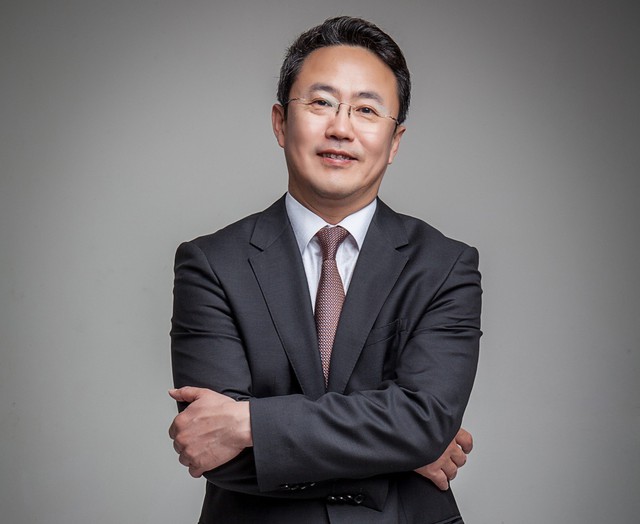New strides and opportunities in Viet Nam-South Korea relations
VGP - Prime Minister Pham Minh Chinh’s official visit to South Korea not only strengthens cooperation between the two countries but also creates new business and investment opportunities for Korean investors.

Chairman of the Korean Chamber of Commerce in Viet Nam (Kocham) Choi Bundo
In a recent interview with VGP, Chairman of the Korean Chamber of Commerce in Viet Nam (Kocham) Choi Bundo underlined the significance of the Prime Minister's recent visit to South Korea, adding that the visit was very successful.
Choi expressed his belief that after the visit, the two countries will make strides in the field of economic and trade cooperation while trade exchanges of Korean businesses operating in Viet Nam will make breakthroughs.
The outcomes of the visit are expected to promote business activities of 10,000 Korean businesses investing in Viet Nam, and encourage Korean firms to invest in renewable energy, cutting-edge technology and artificial intelligence, Choi shared.
Remarkably, within the framework of the visit, Prime Minister Pham and the Vietnamese business delegation had meetings with representatives of Korean chaebols such as Samsung, Hyundai, and LG. At these meetings, the Vietnamese leader briefed about Viet Nam's country, people, and safe and favorable investment environment to attract leading Korean corporations to continue investing and launching long-term operation in the country.
According to Choi, both Vietnamese and Korean Prime Ministers vowed to raise the bilateral trade value to US$100 billion by 2025 and US$150 billion by 2030, which is completely feasible.
Since the two countries established diplomatic ties in 1992, trade turnover between Viet Nam and South Korea has grown over the past 30 years. Bilateral trade constantly increased from US$2 billion in 2000 to US$79.4 billion in 2023. Both countries are each other's third largest trading partner.
Kocham praises Viet Nam's efforts to improve the business environment, as evidenced by the Government promptly issuing policies such as reducing value-added tax (VAT) and extending tax payment deadlines for businesses facing difficulties due to the global economic recession.
In addition, to promote the tourism industry, Viet Nam officially waived visas for 45 days for citizens of some countries to enter the nation under visa exemption regulations.
Especially, Viet Nam has made efforts to increase transparency in administrative procedures for investment licensing and institutional regulations in many sectors via enhancing the application of online registration procedures on the National Public Service Portal. These measures positively support investors' business activities in Viet Nam.
In addition, to date, Viet Nam has successfully joined 16 bilateral and multilateral free trade agreements (FTAs), including the Viet Nam-Korea Free Trade Agreement (VKFTA).
"Thanks to Viet Nam's active participation in FTAs and the nation's appropriate specific tariff and non-tariff policies for Vietnamese goods, Vietnamese businesses can easily participate in the global supply chain. The Government's efforts to improve investment environment and enhance economic integration have created a solid foundation for the nation to develop sustainably," Mr. Choi Bundo emphasized.
The Chairman Kocham expressed his hope that Vietnamese authorities will increase assistance in terms of institution to adapt to changes in the investment environment in the context of Korean investors expanding business activities in the country.
Investment registration certificates within the framework of the signed agreement between the two countries need to be resolved more actively and quickly, he suggested.
Meanwhile, the nation needs to step up reform of work permit procedures, temporary residence cards, customs procedures, and VAT refund regulations.
In addition to incentives to attract big investors, Viet Nam should propose preferential policies for small and medium-sized enterprises which have made great contributions to Viet Nam's economy over the past decades, recommended Choi.
Kocham stands ready to support Viet Nam towards sustainable development
According to Choi, many Korean businesses are looking to expand investment activities in industries related to newly-emerging sectors and renewable energy in Viet Nam.
Kocham is home to 500 Korean businesses operating in textile, footwear and handbag, targeting to export items to the U.S. and Europe.
Consumers in the U.S. and Europe are demanding that Korean manufacturing and processing businesses in Viet Nam produce products using renewable energy sources, including rooftop solar power.
Therefore, the Chairman Kocham expressed his hope that the Vietnamese Government will take measures to support the process of granting necessary licenses for Korean businesses to implement green transition projects in line with requests of international markets.
Regarding high-quality human resource training, specialized training facilities from large Korean companies have come to Viet Nam to train and develop human resources. In addition, highly skilled experts travelled to Viet Nam to share their experience.
"I believe that Korean companies' efforts in human resource training will make contributions to the sustainable and comprehensive development of Viet Nam. In the future, Korean businesses will continue to make continuous efforts for this process," shared the Kocham Chairman.
Kocham always strives to find solutions to support each Korean business investing in Viet Nam, contributing to the development of the Vietnamese economy via interactive activities with local agencies, the Government, international organizations and foreign associations, Mr. Choi emphasized./.
